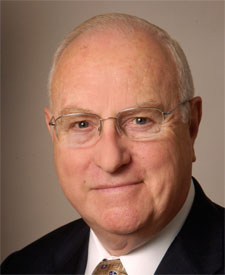Steven C. Beering
Go to Oral HistoryReturn to Biographies & Oral Histories Home

Dr. Beering served as Purdue University’s ninth president, from 1983 to 2000. He came to the university after spending a decade as dean of the Indiana School of Medicine and director of the Indiana University Medical Center. He retired as university president to work on behalf of the Purdue Research Foundation. In 2002 he was appointed to the National Science Board and, in 2006, was elected as its chairman.
Beering was born in Berlin in 1932—the last year of the Weimar Republic. He was the first of two sons in a merchant family that split its activities between Berlin and Hamburg. His father marketed furniture for Thonet, a Vienna-based company. His mother was the only daughter of a family that sold women’s apparel in department stores. His family tried unsuccessfully to flee Hitler’s Germany in 1938, following the Anschluss—the annexation of Austria. The Allied bombing of Hamburg split the family during the war, as Dr. Beering’s father was in Berlin at the time of the raid. At the end of the war, Dr. Beering’s father, who had returned to Hamburg, was reunited with the rest of the family, which had been relocated to a displaced persons camp in Bavaria.
The family restarted their lives in Hamburg. Having missed five years of schooling because of the war, Dr. Beering had to plead with the principal to allow him to enter high school. With the help of his mother, he caught up with his studies. The family eventually made its way to Pittsburgh—where Dr. Beering’s maternal grandparents lived—by way of London. Dr. Beering matriculated at the University of Pittsburgh, where he graduated summa cum laude in 1954 with a B.S. degree. He then entered Pitt Medical School. In the last year of his studies, Beering joined the U.S. Medical Corps—and got married. He received his medical degree in 1958. During twelve years with the Medical Corps, from May 1957 to June 1969, he distinguished himself as director of the internal medicine program at the Wilford Hall Medical Center in San Antonio, Texas, and as consultant to the U.S. Surgeon General. He achieved the rank of lieutenant colonel.
Dr. Beering left the Medical Corps to begin an appointment as professor of medicine and assistant dean at the Indiana University Medical Center. He later served as the Medical Center’s dean of medicine and its director.
An enthusiastic supporter of liberal arts education, Dr. Beering focused much of his attention as president on raising Purdue University’s profile as a comprehensive institution. Enrollment in Liberal Arts grew to make it one of the largest schools on campus. Among myriad efforts to broaden the scope of the university beyond engineering, mathematics, science, and technology, Dr. Beering convinced the Board of Trustees to establish the Presidential Honors scholarship program to “celebrate people who are broadly gauged, and who had a cosmopolitan interest in life and the arts, and knowledge for knowledge’s sake,” as he explained in a 2006 interview. The scholarship program was subsequently renamed in Dr. Beering’s honor. Dr. Beering also headed the effort to create the School of Education and establish cultural centers for African-American students.
Recognizing that state support for the university was insufficient to achieve or maintain world-class status for its programs, Dr. Beering worked tirelessly to develop private support for Purdue’s quantitative expansion and qualitative improvement. Under his leadership, private gifts increased more than fourfold and the university’s endowment became one of the largest in America. Annual support for sponsored research topped $130 million.
During his 17 years as president, more than 20 buildings were constructed on Purdue’s West Lafayette campus, including the Steven C. Beering Hall of Liberal Arts and Education. Thirteen other structures were expanded or renovated.
Not long into his university presidency, Dean of Engineering Henry T. Yang introduced Beering to Charlie Pankow. Charlie and Doris Pankow entertained the Beerings many times at Le Petit Trianon, a classical revival replica of a mansion constructed for Louis XV at Versailles in the 1760s. Built in 1904 in the Presidio Heights neighborhood of San Francisco by a local wool merchant, Pankow acquired it in 1982 to showcase his art collection. In this interview, Dr. Beering recounts these and other occasions and offers his observations on Charlie Pankow’s relationship with his alma mater.

